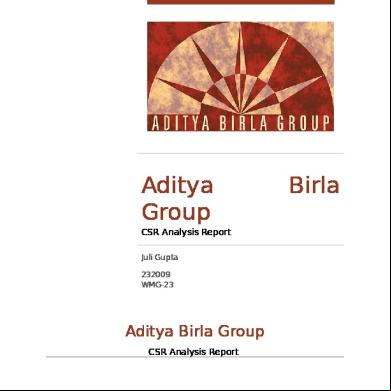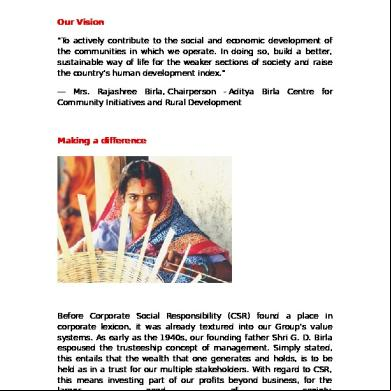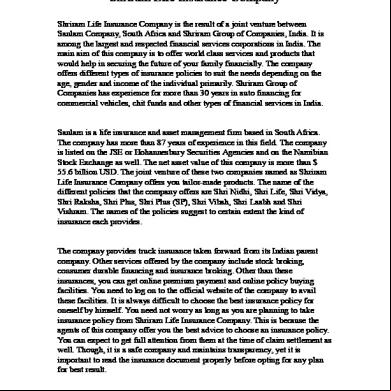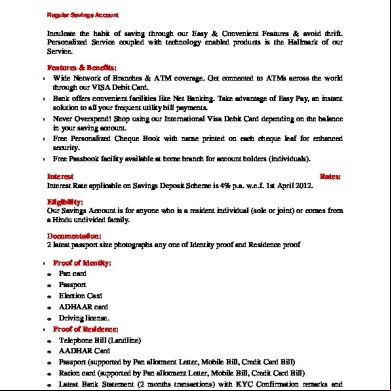Csr Of Aditya Birla Group 232m3
This document was ed by and they confirmed that they have the permission to share it. If you are author or own the copyright of this book, please report to us by using this report form. Report 3i3n4
Overview 26281t
& View Csr Of Aditya Birla Group as PDF for free.
More details 6y5l6z
- Words: 1,035
- Pages: 7
CSR OF ADITYA BIRLA GROUP:
Our Vision "To actively contribute to the social and economic development of the communities in which we operate. In doing so, build a better, sustainable way of life for the weaker sections of society and raise the country's human development index." — Mrs. Rajashree Birla, Chairperson - Aditya Birla Centre for Community Initiatives and Rural Development
Making a difference
Before Corporate Social Responsibility (CSR) found a place in corporate lexicon, it was already textured into our Group's value systems. As early as the 1940s, our founding father Shri G. D. Birla espoused the trusteeship concept of management. Simply stated, this entails that the wealth that one generates and holds, is to be held as in a trust for our multiple stakeholders. With regard to CSR, this means investing part of our profits beyond business, for the larger good of society.
While carrying forward this philosophy, our legendary leader, Mr. Aditya Birla, weaved in the concept of 'sustainable livelihood', which transcended cheque book philanthropy. In his view, it was unwise to keep on giving endlessly. Instead, he felt that channelising resources to ensure that people have the wherewithal to make both ends meet would be more productive. He would say, "Give a hungry man fish for a day, he will eat it and the next day, he would be hungry again. Instead, if you taught him how to fish, he would be able to feed himself and his family for a lifetime." Taking these practices forward, our chairman Mr. Kumar Mangalam Birla, institutionalised the concept of triple bottom line ability represented by economic success. Our community work is a way of telling the people among whom we operate that We Care. Our strategy
Our projects are carried out under the aegis of the "Aditya Birla Centre for Community Initiatives and Rural Development", led by Mrs. Rajashree Birla. The Centre provides the strategic direction, and the thrust areas for our work ensuring performance management as well.
Our focus is on the all-round development of the communities around our plants located mostly in distant rural areas and tribal belts. All our Group companies —Grasim, Hindalco, Aditya Birla Nuvo and UltraTech have Rural Development Cells, which are the implementation bodies. Our partners in development are government bodies, district authorities, village panchayats and the end beneficiaries — the villagers. The Government has, in their 5-year plans, special funds earmarked for human development and we recourse to many of these. At the same time, we network and collaborate with like-minded bilateral and unilateral agencies to share ideas, draw from each other's experiences, and ensure that efforts are not duplicated. At another level, this provides a platform for advocacy.
Project identification mechanism
All projects are planned in a participatory manner, in consultation with the community, literally sitting with them, and gauging their basic needs. We take recourse to "participatory rural appraisal", which is a mapping process. Subsequently, based on a consensus and in discussion with the village panchayats, we prioritise requirements. And thus a project is born. Implementation is the responsibility of the community and our team, as is the monitoring of milestones and the other aspects. Monitoring entails physical verification of the progress and the actual output of the project. Village meetings are held periodically to elicit on the benefits of our community programmes and the areas where these need to be beefed up. We try and ensure that while in the short term we have to do enormous hand-holding, the projects become sustainable by the beneficiaries over the long haul. Once this stage is reached, we withdraw. In this way we do not build a culture of dependence, instead we make the villagers self-reliant.
Model villages:
One of our unique initiatives is to develop model villages, so each of our major companies is working towards the total transformation of a number of villages in proximity to our plants. Making of a model village entails ensuring self-reliance in all aspects viz., education, health care and family welfare, infrastructure, agriculture and
watershed management, and working towards sustainable livelihood patterns. Fundamentally, ensuring that their development reaches a stage wherein village committees take over the complete responsibility and our teams become dispensable.
Our project operations: The geographic reach, annual spends The footprint of our community work straddles 3,000 villages across the length and breadth of our country. We reach out to more than 7 million people annually. Over 60 per cent of these live below the poverty line and belong to scheduled castes and tribes. The Group spends in excess of Rs.130 crore annually, inclusive of the running of 18 hospitals and 42 schools. The Group transcends the conventional barriers of business and reaches out to the marginalised as a matter of duty and to bring in a more equitable society. Our focus areas Our rural development activities span five key areas and our singleminded goal here is to help build model villages that can stand on their own feet. Our focus areas are healthcare, education, sustainable livelihood, infrastructure and espousing social causes.
Education
Formal and non-formal education, adult education Scholarships for girls, merit scholarships and technical education for boys Distance education Girl child education Digital literacy / computer education
Health care and family welfare
Pulse polio programme Mobile clinics — doctors' visits General and multispeciality medical camps, cleft lips Reproductive and child health care, supplementary nutrition / midday meal projects Safe drinking water, sanitation — household toilets, community hospitals HIV / AIDS, cancer, TB awareness and prevention camps Blood donation Responsible parenting
Social causes
Widow re-marriage / dowry-less mass marriages Social security (insurance) Culture and sports
Women empowerment
Infrastructure development
Community centres Schools in villages Health care centres and hospitals Roads Homes for the homeless Rural electrification Irrigation and water storage structures
Sustainable livelihood
Self-help groups (microfinance for women and farmers) Integrated agriculture development Integrated livestock development Watershed management Microenterprise development Skill development / vocational training through Aditya Birla Technology Park for integrated training programme and VT centres at most of our plants in collaboration with ITIs
Our Vision "To actively contribute to the social and economic development of the communities in which we operate. In doing so, build a better, sustainable way of life for the weaker sections of society and raise the country's human development index." — Mrs. Rajashree Birla, Chairperson - Aditya Birla Centre for Community Initiatives and Rural Development
Making a difference
Before Corporate Social Responsibility (CSR) found a place in corporate lexicon, it was already textured into our Group's value systems. As early as the 1940s, our founding father Shri G. D. Birla espoused the trusteeship concept of management. Simply stated, this entails that the wealth that one generates and holds, is to be held as in a trust for our multiple stakeholders. With regard to CSR, this means investing part of our profits beyond business, for the larger good of society.
While carrying forward this philosophy, our legendary leader, Mr. Aditya Birla, weaved in the concept of 'sustainable livelihood', which transcended cheque book philanthropy. In his view, it was unwise to keep on giving endlessly. Instead, he felt that channelising resources to ensure that people have the wherewithal to make both ends meet would be more productive. He would say, "Give a hungry man fish for a day, he will eat it and the next day, he would be hungry again. Instead, if you taught him how to fish, he would be able to feed himself and his family for a lifetime." Taking these practices forward, our chairman Mr. Kumar Mangalam Birla, institutionalised the concept of triple bottom line ability represented by economic success. Our community work is a way of telling the people among whom we operate that We Care. Our strategy
Our projects are carried out under the aegis of the "Aditya Birla Centre for Community Initiatives and Rural Development", led by Mrs. Rajashree Birla. The Centre provides the strategic direction, and the thrust areas for our work ensuring performance management as well.
Our focus is on the all-round development of the communities around our plants located mostly in distant rural areas and tribal belts. All our Group companies —Grasim, Hindalco, Aditya Birla Nuvo and UltraTech have Rural Development Cells, which are the implementation bodies. Our partners in development are government bodies, district authorities, village panchayats and the end beneficiaries — the villagers. The Government has, in their 5-year plans, special funds earmarked for human development and we recourse to many of these. At the same time, we network and collaborate with like-minded bilateral and unilateral agencies to share ideas, draw from each other's experiences, and ensure that efforts are not duplicated. At another level, this provides a platform for advocacy.
Project identification mechanism
All projects are planned in a participatory manner, in consultation with the community, literally sitting with them, and gauging their basic needs. We take recourse to "participatory rural appraisal", which is a mapping process. Subsequently, based on a consensus and in discussion with the village panchayats, we prioritise requirements. And thus a project is born. Implementation is the responsibility of the community and our team, as is the monitoring of milestones and the other aspects. Monitoring entails physical verification of the progress and the actual output of the project. Village meetings are held periodically to elicit on the benefits of our community programmes and the areas where these need to be beefed up. We try and ensure that while in the short term we have to do enormous hand-holding, the projects become sustainable by the beneficiaries over the long haul. Once this stage is reached, we withdraw. In this way we do not build a culture of dependence, instead we make the villagers self-reliant.
Model villages:
One of our unique initiatives is to develop model villages, so each of our major companies is working towards the total transformation of a number of villages in proximity to our plants. Making of a model village entails ensuring self-reliance in all aspects viz., education, health care and family welfare, infrastructure, agriculture and
watershed management, and working towards sustainable livelihood patterns. Fundamentally, ensuring that their development reaches a stage wherein village committees take over the complete responsibility and our teams become dispensable.
Our project operations: The geographic reach, annual spends The footprint of our community work straddles 3,000 villages across the length and breadth of our country. We reach out to more than 7 million people annually. Over 60 per cent of these live below the poverty line and belong to scheduled castes and tribes. The Group spends in excess of Rs.130 crore annually, inclusive of the running of 18 hospitals and 42 schools. The Group transcends the conventional barriers of business and reaches out to the marginalised as a matter of duty and to bring in a more equitable society. Our focus areas Our rural development activities span five key areas and our singleminded goal here is to help build model villages that can stand on their own feet. Our focus areas are healthcare, education, sustainable livelihood, infrastructure and espousing social causes.
Education
Formal and non-formal education, adult education Scholarships for girls, merit scholarships and technical education for boys Distance education Girl child education Digital literacy / computer education
Health care and family welfare
Pulse polio programme Mobile clinics — doctors' visits General and multispeciality medical camps, cleft lips Reproductive and child health care, supplementary nutrition / midday meal projects Safe drinking water, sanitation — household toilets, community hospitals HIV / AIDS, cancer, TB awareness and prevention camps Blood donation Responsible parenting
Social causes
Widow re-marriage / dowry-less mass marriages Social security (insurance) Culture and sports
Women empowerment
Infrastructure development
Community centres Schools in villages Health care centres and hospitals Roads Homes for the homeless Rural electrification Irrigation and water storage structures
Sustainable livelihood
Self-help groups (microfinance for women and farmers) Integrated agriculture development Integrated livestock development Watershed management Microenterprise development Skill development / vocational training through Aditya Birla Technology Park for integrated training programme and VT centres at most of our plants in collaboration with ITIs







